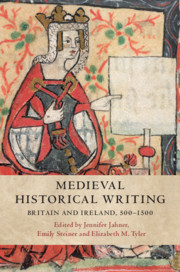Book contents
- Medieval Historical Writing
- Medieval Historical Writing
- Copyright page
- Contents
- Illustrations
- Notes on Contributors
- Abbreviations
- General Introduction
- Part I Time
- Part II Place
- Part III Practice
- Chapter 16 The Professional Historians of Medieval Ireland
- Chapter 17 Gender and the Subjects of History in the Early Middle Ages
- Chapter 18 Historical Writing in Medieval Britain: The Case of Matthew Paris
- Chapter 19 Vernacular Historiography
- Chapter 20 Tall Tales from the Archive
- Chapter 21 History in Print from Caxton to 1543
- Part IV Genre
- Bibliography
- Index
Chapter 20 - Tall Tales from the Archive
from Part III - Practice
Published online by Cambridge University Press: 19 December 2019
- Medieval Historical Writing
- Medieval Historical Writing
- Copyright page
- Contents
- Illustrations
- Notes on Contributors
- Abbreviations
- General Introduction
- Part I Time
- Part II Place
- Part III Practice
- Chapter 16 The Professional Historians of Medieval Ireland
- Chapter 17 Gender and the Subjects of History in the Early Middle Ages
- Chapter 18 Historical Writing in Medieval Britain: The Case of Matthew Paris
- Chapter 19 Vernacular Historiography
- Chapter 20 Tall Tales from the Archive
- Chapter 21 History in Print from Caxton to 1543
- Part IV Genre
- Bibliography
- Index
Summary
The administrative documents preserved in archives tell stories which are shaped by their institutional and governmental context, and are as deceptive and full of invention as more self-consciously literary works. Medieval archives contain a vast repository of historical narratives which, despite their fictional components and bureaucratic manipulation, nevertheless provide vivid insights into everyday life. The rhetorical conventions of such bureaucratic documents as pardons, petitions and appeals represent forms of historical literature which are cultural productions of equal significance to the chronicle or the epic poem. But, unlike court poetry or chronicles, the archives tell us a great deal about the life of ordinary people. In the wake of the discussion of the archive by Foucault and Derrida, the archive has been seen as a symbol of power and a means of control, but often the archive is the chief means by which non-elite groups find their voice.
Keywords
- Type
- Chapter
- Information
- Medieval Historical WritingBritain and Ireland, 500–1500, pp. 356 - 369Publisher: Cambridge University PressPrint publication year: 2019
- 2
- Cited by

